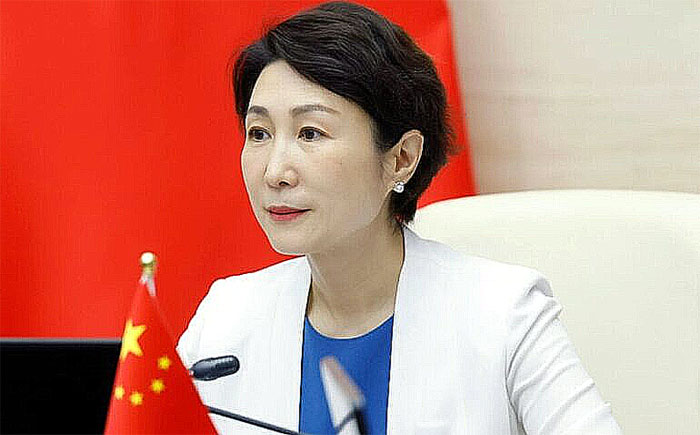
Inside Beijing’s rapid-fire response: rare earth signals, embassy huddles and a warning that echoes across Africa.
The first hint that China would not watch in silence came at 09:12 Beijing time on Tuesday. A short, three-line alert moved on the foreign-ministry wire: *“Spokesperson Mao Ning will host an emergency briefing—topic: Nigeria sovereignty.” Within minutes, state-run *CCTV* scrapped a scheduled segment on pandas and went live from the blue-and-gold press room. What followed was a blunt, almost personal, rebuke to Washington.
“China firmly opposes any country using religion or human rights as an excuse to interfere in other countries’ internal affairs, and threatening other countries with sanctions and force,” Mao told reporters, adding that Beijing “stands with our comprehensive strategic partner Nigeria”.
Translation: keep your troops, and your sermons, on your side of the Atlantic.
A call at 3 a.m., a knock at the embassy. Behind the statement lay a flurry of back-channel traffic. Three diplomats inside the Nigerian embassy in Beijing told this paper that Ambassador Baba Ahmed received a 3 a.m. phone call from Vice-Foreign Minister Chen Xiaodong. The message: *“We will speak loudly tomorrow; you will not stand alone.”* By dawn, Chinese technical staff were already inside the mission, helping to encrypt communications in case of “eventualities”—a euphemism for possible U.S. cyber probing.
Across town, the U.S. embassy on Anjialou Road found its parking lot unusually full. Sources say Ambassador Nicholas Burns summoned defence attachés for a 7 a.m. huddle, partly to assess whether China’s warning was rhetorical and partly to gauge how a Nigerian retort might affect the 2,400 U.S. military personnel still operating in the Gulf of Guinea region.
Hours after the press briefing, China’s customs database showed a new export-licence alert: all shipments of neodymium and praseodymium—minerals critical to U.S. guided-missile steering systems—would now require “extra inspection.” No ban, officials insist, just *“standard safety protocol.”* Industry insiders call it the *“invisible yellow card.”* Washington noticed; Pentagon supply-chain officers held an emergency call with two California defence contractors later that day.
Nigeria is now China’s second-largest African trading partner after South Africa. More importantly, it is the testing ground for Beijing’s new *“Global Security Initiative,”* a doctrine that preaches non-interference in exchange for infrastructure cash. Last year alone, China extended a $1.6 billion loan for the Lagos–Kano railway upgrade and signed a 25-year off-take agreement for 60 % of the yet-to-be-mined iron-ore blocks at Simandou. Any U.S. military footprint that complicates those contracts is, in Beijing’s eyes, a direct challenge to its *“community of shared future”* sales pitch to the Global South.
China’s statement landed just as African Union chair Mohamed Ibn Chambas arrived in Abuja for a pre-planned security visit. Flanked by Nigerian foreign-minister officials, Chambas told reporters:
“Africa has seen enough external adventures. Our problems need African solutions, not foreign bombardments.”
He did not mention China by name, but added: *“We welcome friends who respect our sovereignty.”* Diplomats read the line as a nod to Beijing’s stance.
Inside the U.S. State Department, China’s rapid push-back has forced a recalculation. Officials who briefed *Newsweek* earlier said the Pentagon was weighing *“limited stand-off strikes” or special-forces raids if Nigeria failed to protect Christian communities. By Tuesday night, one source admitted the planning tempo had slowed: *“No one wants a proxy tit-for-tat with Beijing in West Africa.”
Beijing’s support gives Abuja diplomatic cover, but it does not extinguish the original fuse: allegations of mass killings, whatever the actual religious breakdown. Nigerian security services still average one major terror incident a week, and Washington’s domestic politics—especially ahead of a U.S. election year—feeds on vivid headlines.
For now, China has fired its warning shot across the bow, using press conferences, export paperwork and pre-dawn phone calls instead of warships. Whether Washington steers away, or doubles down, will decide if Tuesday’s statement was the end of the crisis—or merely the opening salvo.
As one AU diplomat sighed over coffee in the Abuja Hilton: “When elephants fight, the grass suffers. When elephants argue, the grass still gets trampled. We just hope this argument stays verbal.”
This has been The Red Hot Report from Pepper-Room. The news that bears it all.
#pepperroomnews #pepperroomng #pepperroom www.pepperroom.com.ng
Lagos, Nigeria.
+234 913 161 4181
+234 802 586 9823
+234 803 961 8550
info@pepperroom.com.ng
© 2025 | 🌶️Pepper-Room - Everything Loud, Wild, and Worth Talking About. | All Rights Reserved.
Pepper-Room is not responsible for the content of external sites.